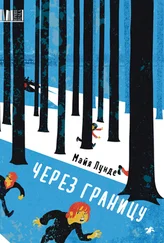Suddenly the door opened.
I stood up quickly.
Charlotte came first. She stared at the floor.
And a dark figure followed behind her. Edmund. She had found him.
“But sweetheart!” Thilda quickly got to her feet.
He was dripping. He took a few unsteady steps across the floor. His hair and clothing were wet, but his trousers were dry, as if somebody had thrown water at him.
“Charlotte?” Thilda said.
“Edmund, he…”
“I fell into the brook,” Edmund said slowly.
Then he staggered past us.
I took a step forward and lay a hand on his shoulder, perhaps it was still not too late to take him with me outdoors, show him and make him understand.
But now I could feel how he was shaking beneath his wet clothes and noticed that his teeth were chattering in his mouth.
“Edmund?”
“I have to sleep,” he murmured without turning around.
Then he squirmed out of my grasp and with shuffling steps he walked towards the stairs to the second floor.
Thilda skipped after him; her feet sounded like hen’s claws against the floor, the chattering, like nervous clucking. “My dear boy. Come, I’ll help you. Look here, walk carefully. Your bed is turned down. Take my arm… like that, yes. Like that.”
His heavy back disappeared up the stairs. I looked down at my hand, it was still damp from having held on to him, and I rubbed it quickly against my trouser leg.
The melancholy that had attacked me so brutally, could it be that it also resided in my son? From my bloodstream to his? Hereditary? Perhaps that was why he never let me in?
My chest tightened. No, not him. Not Edmund.
All of a sudden I became aware of the children; the girls stood in a circle around me. Silent, swaying with drowsiness. Looking at me, awaiting my next move. All except for Charlotte. She did not meet my gaze, but she, too, was pale from lack of sleep.
I drew a breath. “Tomorrow,” I said to them softly. “It will have to wait until tomorrow.”
“Do you know how to get there?”
I stood in the hotel’s worn, nondescript lobby and pointed at the map I had unfolded. The hospital was one of the last on the list. I had worked my way down, crossing out, eliminating one by one.
“There used to be a subway line from here to here,” the receptionist said and pointed, “so you could change there.” She put her finger on the map, not far from the creased edge of a fold.
She was a tall, erect woman, who laughed surprisingly loud and long every time the opportunity presented itself. She was always at work. The others had been relocated, she explained. Now she clung to the hotel, which paid less and less, to provide food for herself and her daughter. The ten-year-old came by every day after school and did her homework in the lobby. It was the only way that mother and daughter could see one another.
“But that’s the part of the subway system the City Council recommends that one should no longer use,” she continued.
I looked at her inquisitively.
“The areas are rough. Occupied. No. Occupied is not the word. But those who still live there have nothing. And nobody controls them anymore,” she said.
“What kind of people are they?”
“The ones who don’t want to move. The ones who were left behind. The ones who hid. It happened so fast and afterwards, if you had regrets, you were told that it was already too late.”
She swallowed and looked away. Perhaps the same was true for her as for the boy and his father in the restaurant. But I couldn’t ask, I couldn’t cope with yet another of these stories.
I just wanted to get going, search, as I’d done every single day since I’d arrived here. He had to be somewhere. Every morning I went out at daybreak, with money and a few dry biscuits wrapped in paper in my purse. Every day I visited a new neighborhood, a new hospital. Many of them I had contacted ahead of time, called both from home and from the hotel. I had the names of units, the names of doctors. Now I sought out the same people, thought that if they knew something, it would be harder to brush me off if I showed up in person, when they saw me, saw the mother, face-to-face. Some of them remembered me and felt bad for me. Some even dared to look me in the eyes and say that they understood my desperation.
But the message was the same everywhere. They couldn’t find any record of him. They had never heard of Wei-Wen. And I was referred elsewhere again and again, to other hospitals. Have you tried in Fengtai, have you tried the Central Hospital in Chaoyang, have you been to the Haidian Center for Respiratory Ailments?
I always asked to speak with a supervisor, seldom gave up with the first person they referred me to. And then I waited. Entire days. Sitting, standing, wandering. By windows, in dark rooms, across cold stone floors, in cheerlessly lit rooms, with a glass of water in my hand, a cup of tea from the vending machine, usually alone, sometimes in drafty waiting rooms. It was never crowded, never busy, nonetheless it seemed as though I was continually bumped down on a list; often I didn’t speak to the right person until it approached closing time. Sometimes I encountered rolling eyes: can’t she give up, there are many desperate people, many ill, undernourished, a single child, she has to calm down, understand that we don’t have time. But I stayed. Did nothing, was simply visible, until I got my way.
On several occasions the waiting led me all the way to the director’s office. Large rooms with heavy furniture, rooms which had once been elegant, but which now spoke of deterioration. I presented my business, got them talking, experienced compassion. Some of them double-checked, called others. They actually tried. But nobody was able to help. Wei-Wen was gone.
In the beginning I called Kuan every evening. But the words between us were few. I let him know that I hadn’t come any closer. He informed me that he hadn’t heard anything, either. Businesslike and more terse with every passing evening. And then he asked about the money, how much I had spent, how much was left. I lied. I couldn’t tell him that the train ticket here alone had cost 5,500 yuan. One evening I didn’t call. He didn’t call me, either. We both knew that neither of us had anything to report. An unspoken agreement had been formed that the one who learned something first would be in touch.
At night I slept heavily and without dreaming, as if somebody had laid a black carpet over my consciousness as soon as my head hit the pillow. Knowing there was nothing more I could do gave me equilibrium. I was certain I’d find him in the end. I simply mustn’t give up. But as the days passed, it became harder to believe. The further down I got on the list, the more uneasy I became. Because I still hadn’t found Wei-Wen, no trace of him. And the money had disappeared more quickly than I had planned; the tin box had become far too light. I didn’t have more than 7,000 yuan left. It could still be enough, if we were really thrifty during the last two years before the age limit. But I still hadn’t bought the train ticket home.
“It’s been a long time since I’ve heard anything from that area,” the receptionist said quietly. “Perhaps it’s completely deserted now. Regardless, we have been advised to stay away.”
“But the hospital?”
“It’s on the border.” She pointed. “The uncontrolled areas start here. Further south you can still travel. But are you certain that you have to go there?”
I nodded.
She held my gaze and understood. She knew I was searching for my son, but I hadn’t told her more than that. Although, that was probably enough. Everyone who has children of their own understands that it’s enough, enough so any danger to which you might potentially expose yourself comes second.
Читать дальше









